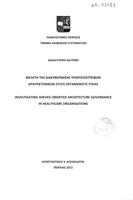Μελέτη της διακυβέρνησης υπηρεσιοστρεφών αρχιτεκτονικών στους οργανισμούς υγείας
Investigating service oriented architecture governance in healthcare organisations

Doctoral Thesis
Συγγραφέας
Κουμαδίτης, Κωνσταντίνος Χρήστος
Ημερομηνία
2013Επιβλέπων
Θεμιστοκλέους, ΜαρίνοςΠροβολή/
Θεματική επικεφαλίδα
Υγεία -- Πληροφοριακά συστήματα ; Πληροφοριακά συστήματα -- Διοίκηση και οργάνωσηΠερίληψη
This dissertation focuses on SOA Governance in healthcare organisations. SOA has emerged to support organisations overcoming their integration problems and it has been adopted by many organisations in various sectors, including healthcare. Despite SOA benefits, many organisations claim they face problems and will not expand SOA use. This reveals that even thought SOA is considered a valuable architectural paradigm it still hasfactors that affect its applicability. This is extremely important as investments of hundreds ofthousands ofEuros do not lead to the expected outcomes and in some cases result in failure. A failure in a healthcare organisation’s IT infrastructure is not an option as the literature is full of cases where healthcare ITfailures cost patients’ lives. So the researcher investigated the SOA Critical Success Factors (CSF) in healthcare
and identified that SOA Governance is depicted as a critical dimension to SOA that is requiredfrom an early stage. The top priority given to SOA Governance is in accordance with the views ofmany researchers who report that SOA implementations require governance mechanisms to excel, otherwise the architecture will end up complex, uncontrolled, brittle and eventually discarded. To this end, the researcher focused the research on the role of SOA Governance in healthcare
organization and explained the main concepts ofSOA Governance providing a detailed description of the theoretical approaches surrounding this research area. The identified SOA Governance models shared common issues, but also hold differences (scale, detail and analysis) and limitations (confusion, overlapping, lack of testing and healthcare aspects). Thus, to extend the established norms and to overcome the limitations identified in literature, the researcher proposed a SOA
Governance framework integrated with nine elements, such as (a) Organisational Structures, (b) Roles, (c) Maturity Model, (d) Roadmap, (e) SOA Governance Infrastructure, (f) Policies, (g) Metrics , (h) Best Practices, and (i) Governance Processes. This conceptualisation pinpointed attributes and guidelines for each element, required successfully governing a SOA and tackling
longstanding Healthcare Information Systems (HIS) challenges. The researcher claims that such an approach is significant and novel as: (a) it incorporates a unique formulation combining the identified common elements of SOA Governance, the SOA CSFs and HIS challenges and (b) the framework could be used as a decision making toolfor SOA Governance. The author discusses the application of this approach by using a qualitative, interpretive, multiple case study research strategy. Empirical data collected from two case organisations show that such an approach contributes towards more robust decisionsfor SOA Governance and indicates that it is acceptable by the organisations and the interviewees that participated in this research. Despite these results, the approach cannot be generalised, but it is the researcher intention to allow others to relate their
views with the ones reported in this dissertation. This dissertation introduces, tests and presents a novel SOA Governance Framework in healthcare and contributes to the body of knowledge by extending the literature.


